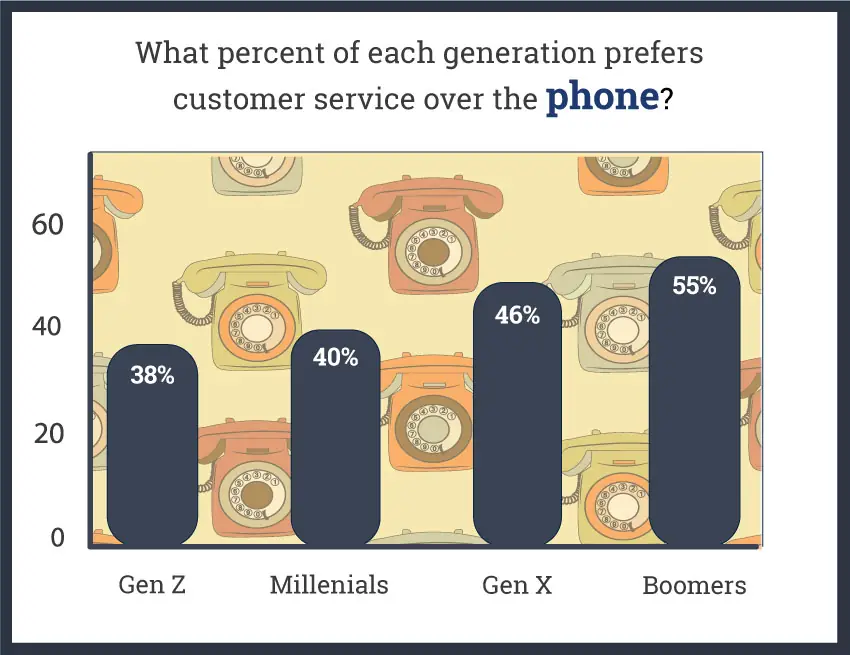The call center is becoming most customers' last resort. The younger generations, in particular, prefer customer service over webchat, SMS, or social media rather than over the phone. Therefore, call volume in call centers has decreased. However, with call centers being the last line of defense, customer service over the phone is more important now than ever before.
Here is a classic example:
A customer is looking to buy a new mattress for their bed. They do some research online and eventually decide on a company from which to purchase a mattress. However, the trouble is that this company has many different types of mattresses. The customer reads different reviews and descriptions of each kind but still can't decide which mattress is right for them. Finally, they call the customer support line and speak to a live agent who personally helps them determine which mattress is best for them.
This is a prime example of why call centers are crucial for delivering customer satisfaction because of their personalization ability. Online reviews, descriptions, and webchats are quick and convenient, but they lack a key ingredient that needs to be supplemented by call centers when necessary. If a customer has a specific question, they need to be able to get a specific answer, and calling a support line is usually the quickest and easiest way to do so.
How Is Customer Service Changing in the Call Center Industry?
The call center industry today is vastly different from what it was, say, 20 years ago. Technological advancements have played a central role in reshaping customer support. This has resulted in increased efficiency and faster issue resolution.
In the past, call centers primarily relied on manual processes and often struggled with long wait times and inefficient call routing systems. Today, automation is a key component, with interactive voice response (IVR) systems and AI-driven chatbots handling routine queries, reducing wait times, and allowing human agents to focus on more complex issues.
Furthermore, the call center industry has witnessed a significant expansion of communication channels. Two decades ago, phone support was the primary means of contact. However, today's call centers offer multi-channel support, including email, live chat, social media, and self-service portals. Customers now expect a seamless experience across these channels, necessitating call centers to adapt and provide consistent, personalized support across various platforms.
We are seeing a declining preference for customer service over the phone from the younger generations. For example, Gen Z would prefer receiving customer service online via live chat or social media messaging. In contrast, a Baby Boomer would prefer to receive customer service over the phone.

Older generations, such as Baby Boomers and some Gen Xers, often grew up in a time when phone calls were the primary means of communication, and they tend to be more comfortable with this mode of interaction. They value the personal touch, immediacy, and ability to engage in a conversation with a real person, which phone calls provide.
Many companies have adopted an omnichannel approach in response to these generational preferences. This strategy provides customers with a choice of communication channels, including phone, email, live chat, and more. This flexibility allows companies to cater to their customer base's diverse needs and preferences, ensuring that both older and younger customers are served effectively.
Omnichannel contact centers seamlessly integrate and synchronize customer interactions and transactions across multiple channels, such as online, in-store, phone, and social media, to provide a cohesive and consistent customer experience. It aims to create a unified and holistic customer journey, regardless of the channel through which the customer engages with the brand.
A data-driven approach also characterizes the industry's transformation. Modern call centers harness advanced analytics and customer relationship management (CRM) systems to collect and analyze customer data. This enables personalization of interactions, data-informed decision-making, and predictive customer service, ultimately leading to improved customer satisfaction.
All these changes collectively underline the evolution of the call center industry into a more efficient, personalized, and multi-channel support environment, better aligned with contemporary customer expectations and technological capabilities.
Why Is Personalization Important in Customer Service?
Personalization is vital in customer service because it adds a human touch to interactions, making customers feel valued and understood. Call centers excel at delivering this personalized experience, particularly for customers who turn to them as a last resort after exhausting online resources.
Speaking to a live agent allows for empathetic and tailored communication, leading to more effective problem resolution and higher customer satisfaction. Call center agents can actively listen, empathize, and adapt their responses, de-escalating tense situations and providing emotional support where needed.
SQM research shows that 87% of customers view tone of voice as the most important aspect of the customer communication experience. This statistic alone demonstrates that call centers need to ensure to need their agents to have strong interpersonal skills to deliver high Csat.
Moreover, personalized interactions enable the building of long-lasting customer relationships, as agents can access and utilize historical information and preferences. These relationships foster customer loyalty and trust over time, benefiting businesses.
Additionally, call centers are well-suited for collecting valuable feedback and data, which can be used to continually improve customer service processes and refine product or service offerings. Personalization is critical to providing a superior customer experience that not only resolves issues effectively but also builds lasting relationships and fosters customer loyalty.
Why Are Call Centers More Important Now Than Ever?
Although the call volume in call centers has steadily decreased for some time, this does not mean that call centers are becoming less important for customer service. In fact, one could argue that it means the opposite. Call centers are more important now because they are the last line of defense.
For example, let's say a customer is working from home and suddenly starts having Wi-Fi issues. They need to resolve this quickly so that they can get back to work. They try troubleshooting online, but none of the solutions seem to work. Here are two scenarios:
- The customer contacts the company through live chat. Texting back and forth takes some time, and the customer grows impatient while waiting for message responses. The customer also feels frustrated by the communication struggles of explaining the issue in writing.
- The customer calls the company, and a live agent handles the call. The customer describes the situation, and the agent actively listens while asking clarifying questions. The agent then walks the agent through the troubleshooting steps.

It is evident that the customer who had the option to call a customer support line and speak with a live agent had a better customer experience than the one who did not. Without the possibility of the support that a call center provides, customers are likely to experience higher frustration and have decreased Csat.
Calling a call center can be more beneficial if a customer faces a complex technical issue with a product or service. In this scenario, a customer can have a real-time conversation with a trained support agent who can ask clarifying questions, provide step-by-step instructions, and troubleshoot the problem together.
This can be especially helpful for issues that require in-depth explanations, hands-on guidance, or diagnostic processes that are difficult to convey through text-based channels like email or live chat. Call centers lead to faster and more practical issue resolution compared to the back-and-forth exchanges that can occur via email or live chat.
Call centers also provide a crucial human touch in a world that is becoming more automated and digitized. They offer empathy, personalization, and immediate assistance, which are especially valuable when addressing sensitive or emotional issues.
In addition, call centers are essential in industries where detailed consultations, complex sales, regulatory compliance, and issue tracking are necessary. Their role has expanded beyond traditional customer service, encompassing functions like market research, feedback collection, and ensuring accessibility for a diverse customer base, making them more vital than ever in meeting the evolving needs of businesses and customers.
With the expectations for excellent customer service in call centers higher than ever, it is a great time for companies to invest in quality assurance software. mySQM™ Customer Service QA Software is an effective and efficient way for companies to get a holistic and transparent score for their most important metrics, such as Csat, FCR, call resolution, AHT, sentiment (e.g., empathy, CX journey), and compliance data. mySQM™ is a single QA platform for call centers to improve customer and employee experience.
Request a mySQM™ Customer Service QA Demo Video
Learn about SQM's agent… CSAT prediction model, which is based on standardized metrics, AI, and regression analysis to predict customer satisfaction derived from a QA evaluation. Our CSAT prediction model provides a high statistical correlation, translating to a 95% success rate in predicting agent CSAT in most cases.
